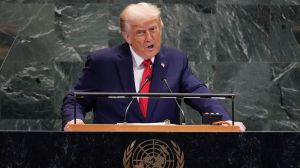Worth the weight… in gold
The shuttle from the media centre to the Beijing University of Aeronautics and Astronautics Gymnasium on this windy...

The shuttle from the media centre to the Beijing University of Aeronautics and Astronautics Gymnasium on this windy, wet evening has so many journalists admitting to this being their first trip to a weightlifting competition that you have to wonder. Are they too taking directions from Google?
On Sunday, the icon at the search engine’s website has a mouse holding aloft a barbell so cheerfully that a visit to the stadium seemed pre-ordained.
Weightlifting is the embodiment of strength in the Olympic motto. But the discipline’s big guy is not in Beijing — Hossein Rezazadeh, better known as the “Iranian Hercules”, having taken the gold in the super heavyweight category in Sydney and Athens, says he’s been advised against “heavy and stressful activity”. (Neither is India’s L. Monika Devi — but that is another story.)
Today, in any case, belongs to the other end of the scale. Thailand’s Prapawadee Jaroenrattanatarakoon has just taken the gold in the women’s 53 kg category. She once had a shorter name, but changed it last year for good luck. Television commentators are still struggling with it.
By the time the men’s 56 kg category competition is in full swing, the crowd has worked up a lively rhythm.
The loudest cheer is reserved for local boy Long Qingquan, whose boyish looks confirm his age when the announcer credits him with setting two records today — in snatch (132 kg) and in the total (292 kg). Of course, he also takes the gold.
There are lots of juniors around, by all accounts. Eko Yuli Irawan of Indonesia, who finished with bronze, had set the junior world record at 288 kg earlier in the day.
The visit has been worth it. On television, weightlifting appears to be too much of a workmanlike category. Powder your hand, grab a bar weighted with discs more than twice you weight, or the equivalent of so many refrigerators, hold it overhead till your arms are properly extended, and then drop it making sure your feet are not in the way.
The sound effects provided by the crowd show how false and simplistic that is. As a weightlifter picks up the bar and squats, the roar begins, picking up strength as he then stretches his legs, the sound somehow managing to convey that it is the legs that really do the carrying, more than the arms and shoulders. In fact too much arm just gets in the way. It’s an aspect sport historians, like the much quoted David Wallechinsky, amply highlight with photographs of Joe De Pietro. The 4 ft, 10 inches tall American, who won the first gold in this category (London 1948), had arms so short that they would have taken the bar just inches above his head.
But weightlifting is a sport of many oddities. To qualify to compete in the Olympics — besides in the wildcard categories — it’s not your individual performance that matters, but your national team’s. Depending on the team ranking in the world, a country gets in a certain number of competitors.
Weightlifting’s not quite rocket science, but the trip to the aeronautics campus has been informative. After all, that’s what the Olympics are about too. To alert us that to observe is to learn.
Now, I wonder, where will Google send us off to tomorrow.
Photos



- 01
- 02
- 03
- 04
- 05




























